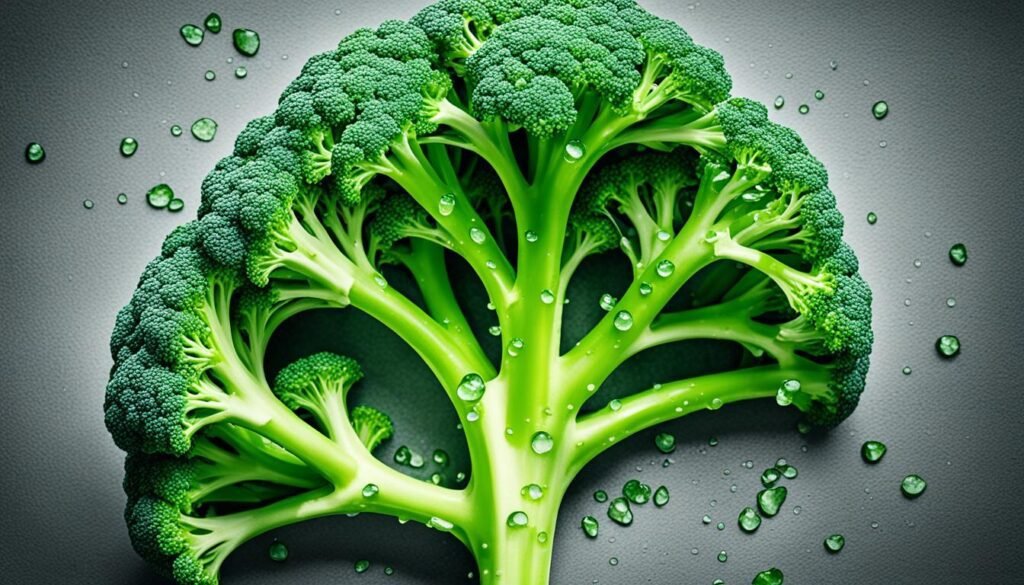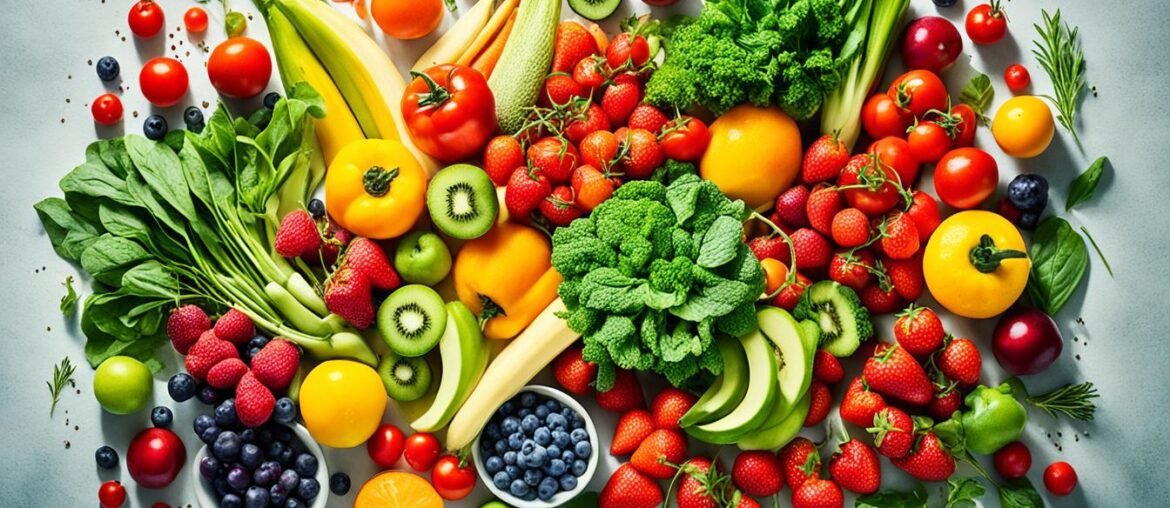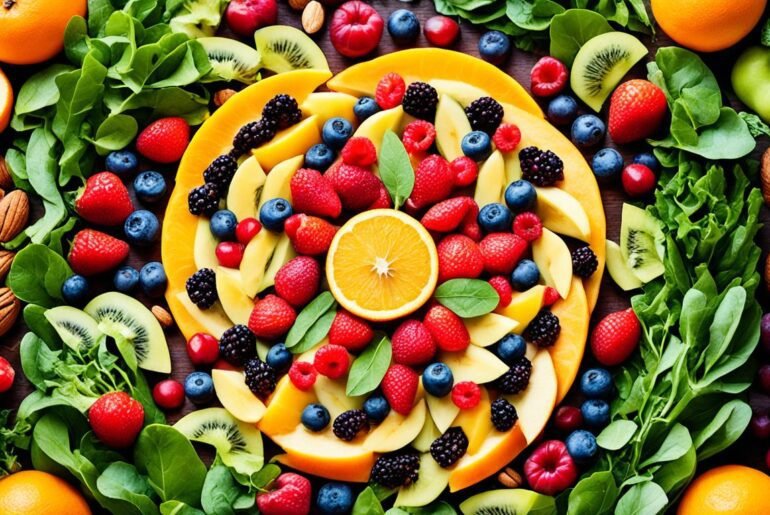Did you know that your skin is the largest organ in your body, covering an average of 20 square feet? This incredible organ plays a crucial role in protecting your body from external factors, making it essential to give it the care it deserves. While skincare products are important, one often overlooked aspect of achieving radiant and glowing skin is maintaining a healthy, well-rounded diet. That’s right, what you eat can have a profound impact on the health and appearance of your skin.
When it comes to nutrition for skin, certain key nutrients stand out as skin-friendly powerhouses. Selenium, zinc, omega-3 fats, and vitamins A, C, and E are among the most beneficial nutrients for promoting skin health. Incorporating these nutrients into your diet through a variety of skin-friendly foods can help slow down signs of aging, improve skin moisture and elasticity, and reduce the risk of skin-related conditions.
Key Takeaways:
- A healthy, well-rounded diet is essential for promoting youthful and radiant skin.
- Nutrients like selenium, zinc, omega-3 fats, and vitamins A, C, and E play a crucial role in skin health.
- Incorporating skin-friendly foods into your diet can improve skin moisture, elasticity, and reduce the risk of skin-related conditions.
- Eating a variety of skin-friendly foods is a natural and effective way to nourish your skin from within.
- By prioritizing a skin-friendly diet, you can unlock your natural beauty and enhance your skin radiance.
Best Foods for Skin Health: Strawberries
When it comes to maintaining healthy and radiant skin, incorporating the right foods into your diet can make a significant difference. One fruit that stands out for its skin health benefits is strawberries. Not only are they delicious, but they are also packed with skin-friendly nutrients that promote a glowing complexion.
Strawberries are rich in vitamin C, which plays a crucial role in protecting the skin from oxidative damage. This essential vitamin also plays a key role in collagen production, a protein responsible for maintaining the skin’s structure and elasticity. By consuming strawberries, you can support collagen synthesis and improve the overall health of your skin.
Strawberries are also loaded with other skin-loving substances, including anthocyanins, phenolic acids, and flavonoids. These compounds have antioxidant and anti-inflammatory properties that help protect the skin against external factors and promote a healthy complexion.
If you’re looking for a tasty way to improve your skin health, consider adding strawberries to your diet. Whether you enjoy them fresh, in smoothies, or added to salads, incorporating this vibrant fruit can provide numerous benefits for your skin.
Gut Health and Skin: The Importance of Probiotics and Fiber

A healthy gut is crucial for maintaining optimal skin health. Imbalances in gut bacteria can contribute to various skin conditions, including acne and psoriasis. By focusing on gut health and incorporating probiotics and fiber-rich foods into your diet, you can promote both a healthy gut and glowing skin.
Probiotics are beneficial bacteria that support gut health and have been shown to have positive effects on the skin. These live microorganisms help balance the gut microbiome, reducing inflammation and promoting overall skin health. Including probiotic-rich foods like yogurt, kefir, sauerkraut, and kimchi in your diet can provide a natural source of probiotics for your gut and skin.
“A healthy gut leads to healthy skin. By nourishing your gut with probiotics, you can promote an environment that supports radiant and clear skin.”
Fiber is another essential component for skin health. A diet high in fiber-rich foods supports a healthy gut by promoting regular bowel movements and reducing inflammation. This, in turn, can contribute to healthy and glowing skin. Include fiber-rich foods like fruits, vegetables, whole grains, and legumes in your meals to support both gut health and skin radiance.
Kimchi, a popular Korean dish, deserves a special mention when it comes to promoting gut and skin health. This fermented food is made with Chinese cabbage and a variety of other ingredients, including radishes, garlic, and spices. Kimchi is rich in probiotics, which help balance gut bacteria and support skin health. It also contains provitamin A and vitamin C, nutrients that are beneficial for achieving a healthy and vibrant complexion.
To summarize, nurturing a healthy gut plays a vital role in maintaining optimal skin health. Incorporating probiotics and fiber-rich foods into your diet, such as kimchi, can support a healthy gut and promote radiant and glowing skin.
The Benefits of Kimchi for Skin Health:
| Nutrients | Benefits for Skin |
|---|---|
| Probiotics | Support a healthy gut and reduce skin inflammation |
| Provitamin A | Promote skin cell turnover and contribute to a vibrant complexion |
| Vitamin C | Boost collagen production and protect against skin damage |
Sunflower Seeds: Skin-Nourishing Powerhouse
https://www.youtube.com/watch?v=q1uTwJSPKyg
When it comes to nourishing your skin, sunflower seeds are a true powerhouse. These tiny seeds are packed with essential nutrients that promote skin health and radiance. Let’s explore the amazing skin benefits of sunflower seeds and how they can contribute to a glowing complexion.
Vitamin E for Skin: Protection and Collagen Synthesis
Sunflower seeds are exceptionally rich in vitamin E, a potent antioxidant that plays a vital role in protecting skin cells from sun damage and inflammation. Vitamin E also promotes collagen synthesis, a process essential for maintaining the skin’s elasticity and firmness. By incorporating sunflower seeds into your diet, you can give your skin the nourishment it needs to ward off environmental stressors and maintain a youthful appearance.
Protein for Wound Healing and Repair
Another remarkable benefit of sunflower seeds is their high protein content. Protein is crucial for wound healing and tissue repair, making it essential for maintaining healthy skin. By consuming sunflower seeds, you provide your body with the building blocks it needs to support the healing process and promote healthy skin regeneration.
Skin Health Maintenance with Selenium and Zinc
In addition to vitamin E and protein, sunflower seeds are a rich source of minerals like selenium and zinc, which are vital for skin health maintenance. Selenium acts as a powerful antioxidant, protecting skin cells from oxidative damage and inflammation. It also helps regulate inflammation, which can contribute to a clearer complexion. Zinc, on the other hand, plays a crucial role in skin healing and integrity. It promotes wound healing, regulates oil production, and supports the skin’s barrier function.
By incorporating sunflower seeds into your daily diet, you can enjoy the remarkable skin benefits provided by these nutrient-packed seeds. Whether you enjoy them as a snack or add them to your meals, sunflower seeds can make a significant difference in the health and radiance of your skin.
“Sunflower seeds are a fantastic source of skin-nourishing nutrients, including vitamin E, protein, selenium, and zinc. Incorporating them into your diet can promote skin health, protect against damage, and support wound healing.”
Bone Broth: Hydration and Skin Regeneration

In my quest for healthy, radiant skin, I stumbled upon an ancient elixir that has been gaining popularity in recent years – bone broth. This nutrient-dense liquid, made by simmering collagen-rich animal bones for extended periods, offers a multitude of benefits for skin health.
One of the key components of bone broth is gelatin, a substance derived from collagen. Gelatin is rich in amino acids, such as glycine, proline, and lysine, which play crucial roles in collagen synthesis and skin repair. These amino acids contribute to the regeneration of skin cells, helping to improve skin texture and elasticity.
Hydration is essential for healthy skin, and bone broth can contribute to your skin’s hydration needs. When you consume bone broth, you’re not only providing your body with much-needed fluids, but you’re also replenishing it with electrolytes and minerals that help maintain skin health and integrity.
Furthermore, bone broth is a natural source of several essential nutrients that support overall skin health. It contains minerals like calcium, magnesium, and phosphorus, which are necessary for maintaining strong and resilient skin.
So, how can you incorporate bone broth into your skincare regimen? Consider sipping on a warm cup of bone broth as a midday pick-me-up or adding it to soups and stews for a nourishing boost. You can even use bone broth as a cooking liquid for grains or vegetables, infusing your dishes with its skin-loving nutrients.
Remember, a healthy diet goes hand in hand with a well-rounded skincare routine. By including bone broth in your diet, you can provide your skin with the hydration, collagen-building amino acids, and essential minerals it needs to thrive.
| Benefits of Bone Broth for Skin |
|---|
| Bone broth provides essential amino acids for collagen synthesis, promoting skin repair and regeneration. |
| The hydration from bone broth helps maintain skin moisture and improve skin health. |
| Minerals in bone broth, like calcium and magnesium, support the overall health and integrity of the skin. |
Organ Meats: Skin Nutrition Powerhouses
When it comes to skin health, organ meats may not be the first thing that comes to mind. However, these often overlooked protein sources are packed with essential vitamins and minerals necessary for maintaining healthy skin. One organ meat that stands out for its skin benefits is beef liver.
Beef liver is not only a rich source of high-quality protein but also provides a range of skin-boosting nutrients. One such nutrient is copper, which plays a vital role in protecting the skin from free radicals and oxidative damage. By neutralizing these harmful molecules, copper supports overall skin health and helps maintain a youthful appearance.
Organ meats, including beef liver, are also concentrated sources of selenium, vitamin A, and zinc. Selenium, an important antioxidant, helps protect the skin from oxidative stress and promotes healthy cellular function. Vitamin A, on the other hand, aids in skin cell turnover and regeneration, contributing to a smoother complexion. Lastly, zinc is essential for collagen synthesis, wound healing, and maintaining the integrity of the skin.
By including organ meats like beef liver in your diet, you can provide your skin with the necessary nutrients it needs to stay healthy and radiant.
The Benefits of Organ Meats for Skin Health:
- High-quality protein for skin regeneration and repair
- Copper for skin protection against free radicals
- Selenium for antioxidant defense and healthy skin cells
- Vitamin A for skin cell turnover and regeneration
- Zinc for collagen synthesis and wound healing
Adding organ meats like beef liver to your diet can provide a natural and nutrient-rich way to support your skin health and enhance your overall complexion.
Shellfish: A Smart Choice for Healthy and Glowing Skin

When it comes to promoting healthy and glowing skin, shellfish should not be overlooked. Oysters, clams, and mussels are excellent choices that offer a range of benefits for your skin’s health and appearance. These delicious seafood options are not only flavorful but also rich in essential nutrients that support skin function and protection.
One of the key reasons why shellfish is beneficial for skin health is its high content of skin-supporting minerals, such as zinc, selenium, and copper. Zinc plays a crucial role in regulating inflammation, stimulating wound healing, and protecting the skin against UV damage. Selenium, on the other hand, boasts powerful antioxidant properties that safeguard skin cells from oxidative stress, promoting overall skin health.
Moreover, shellfish is a good source of omega-3 fats, which offer incredible anti-inflammatory effects and contribute to optimal skin function and structure. These fatty acids help maintain skin elasticity, reduce redness and irritation, and enhance overall skin health.
Benefits of Shellfish for Skin Health:
- Rich in skin-supporting minerals like zinc, selenium, and copper
- Zinc regulates inflammation, stimulates wound healing, and protects against UV damage
- Selenium offers powerful antioxidant properties, protecting skin cells from oxidative stress
- Omega-3 fats contribute to skin function and structure, reducing redness and enhancing elasticity
Indulging in shellfish not only satisfies your taste buds but also nourishes your skin from within, giving you a healthy and radiant complexion.
Next time you’re planning a seafood feast, consider including a variety of shellfish in your menu. Not only will you enjoy their delectable flavors, but you’ll also give your skin a boost of essential minerals, antioxidants, and omega-3 fats, resulting in healthier, glowing skin.
Broccoli: Antioxidant-Rich Superfood for Skin Health

Broccoli is a nutrient powerhouse that offers numerous benefits for skin health. Its impressive array of vitamins, minerals, and antioxidants make it a must-have addition to your diet for maintaining healthy and glowing skin.
One of the key reasons why broccoli is highly beneficial for your skin is its abundance of polyphenol antioxidants. These compounds help combat the signs of aging by neutralizing harmful free radicals that can cause damage to your skin cells. By protecting your skin from oxidative stress, these antioxidants promote a youthful and radiant complexion.
Another skin-loving nutrient found in broccoli is beta-carotene, a precursor to vitamin A. Beta-carotene provides essential protection against harmful UV rays, reducing the risk of sunburn and skin damage. This vitamin is also known for its role in skin cell turnover and regeneration, keeping your skin looking fresh and revitalized.
In addition to its antioxidant properties, the fiber content in broccoli is crucial for maintaining a healthy gut environment, which directly impacts your skin health. A balanced gut microbiome helps reduce inflammation and prevents common skin conditions, such as acne and eczema.
A diet high in vegetables, including broccoli, has also been linked to a lower risk of developing skin cancer. The combination of various antioxidants, vitamins, and minerals found in broccoli works together to protect your skin from harmful UV radiation and potentially prevent the formation of skin cancer cells.
Make the most of this antioxidant-rich superfood by incorporating broccoli into your meals regularly. Whether enjoyed steamed, stir-fried, or in salads, you can harness the amazing benefits of broccoli to promote healthy, vibrant, and youthful skin.
Broccoli Nutritional Facts
| Nutrient | Amount per 100g |
|---|---|
| Calories | 34 |
| Protein | 2.8g |
| Fat | 0.4g |
| Carbohydrates | 6.6g |
| Fiber | 2.6g |
| Vitamin C | 89.2mg (149% DV) |
| Vitamin K | 101.6mcg (127% DV) |
| Vitamin A | 623IU (12% DV) |
| Folate | 63mcg (16% DV) |
| Potassium | 316mg (9% DV) |
Conclusion
Achieving radiant and glowing skin is not just about skincare products; it starts from within with a healthy diet. By nourishing your skin with a variety of skin-friendly foods, you can unlock your natural beauty and enhance your skin radiance.
Strawberries, sunflower seeds, and broccoli are excellent choices for promoting skin health. These foods provide essential nutrients such as vitamins C and E, zinc, selenium, and omega-3 fats. These nutrients play a crucial role in protecting the skin from damage, promoting collagen production, regulating inflammation, and supporting overall skin health.
Remember, your skin is your largest organ, and taking care of it involves more than just what you put on the surface. By nourishing your skin from within, you can nourish your overall well-being and achieve radiant, healthy skin.
FAQ
How does diet affect skin health?
Maintaining a healthy diet is essential for promoting youthful and radiant skin. Consuming a variety of skin-friendly foods can help slow down signs of aging, improve skin moisture and elasticity, and reduce the risk of skin-related conditions.
What nutrients are beneficial for skin health?
Certain nutrients, such as selenium, zinc, omega-3 fats, and vitamins A, C, and E, are particularly beneficial for skin health. These nutrients help protect the skin from damage, promote collagen production, regulate inflammation, and support overall skin health.
How do strawberries benefit the skin?
Strawberries are packed with skin health-promoting substances, including vitamin C, anthocyanins, phenolic acids, and flavonoids. Vitamin C plays a crucial role in protecting skin cells from oxidative damage and is essential for collagen production.
How do probiotics and fiber support gut and skin health?
Consuming foods rich in probiotics and fiber can support both gut and skin health. Probiotics and fiber help maintain a healthy gut environment, which is closely linked to skin health. Kimchi, a fermented dish made with Chinese cabbage, is rich in probiotics and nutrients that benefit the skin.
What are the skin benefits of sunflower seeds?
Sunflower seeds are a powerhouse of nutrients for skin health. They are rich in vitamin E, selenium, and zinc, all of which play critical roles in maintaining healthy skin. Vitamin E protects skin cells from sun damage, while selenium and zinc regulate inflammation and promote wound healing.
What are the benefits of bone broth for the skin?
Bone broth is a nutrient-dense liquid that supports skin health. It contains gelatin, a substance derived from collagen, which helps repair and regenerate skin cells. Drinking bone broth provides hydration and essential amino acids for healthy skin.
How do organ meats contribute to skin health?
Organ meats, such as beef liver, are incredibly nutrient-dense and provide various vitamins and minerals necessary for skin health. Beef liver, for example, is rich in protein and covers daily needs for copper, which protects the skin from free radicals and oxidative damage.
Why are shellfish a smart choice for healthy skin?
Shellfish, such as oysters, clams, and mussels, are excellent choices for promoting healthy and glowing skin. They are rich in skin-supporting minerals like zinc, selenium, and copper. These minerals regulate inflammation, protect against UV damage, and contribute to skin function and structure.
How does broccoli benefit skin health?
Broccoli is a nutrient powerhouse that offers numerous benefits for skin health. It is rich in fiber, polyphenol antioxidants, and beta-carotene, all of which promote a healthy gut environment, protect against UV damage, provide anti-inflammatory effects, and support skin regeneration. A diet high in vegetables, including broccoli, is associated with a lower risk of developing skin cancer.
How can a healthy diet improve skin radiance?
A healthy diet is a key factor in achieving radiant and glowing skin. Consuming a variety of skin-friendly foods provides essential nutrients that protect the skin, promote collagen production, regulate inflammation, and support overall skin health. By nourishing your skin from within, you can unlock your natural beauty and enhance your skin radiance.




